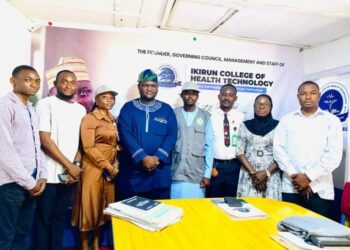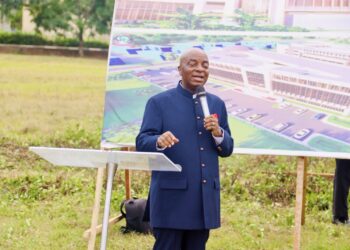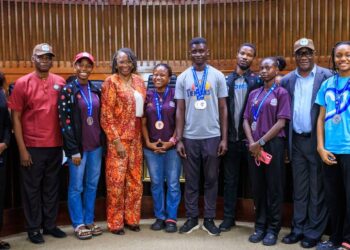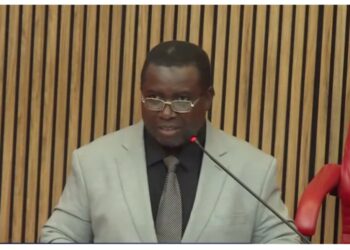The West African Examinations Council has ramped up preparations for the full implementation of the Computer-Based West African Senior School Certificate Examination for school candidates with the May/June 2026 diet.
As part of its nationwide sensitisation campaign, WAEC officials on Wednesday visited various parts of Lagos, including Yaba, Ojo, Ikeja, Ikorodu, Maryland, and Surulere, to enlighten students, parents, and teachers on the Council’s digital transition.
Led by the Head of the National Office, Dr Amos Dangut, the exercise featured roadshows, community engagements, and the distribution of educational materials explaining the procedures and benefits of the new testing model.
The exam body, alongside the Federal Government, has insisted on a computer-based examination transition for school candidates sitting the May/June examination next year.
This transition comes amid fears of stakeholders about the nation’s readiness for conducting computer-based examinations, especially pointing to the technical glitches that initially greeted the release of the 2025 WASSCE for school candidates.
It would be recalled that WAEC began the computer-based examination transition in 2024 with private candidates through a hybrid model in which multiple-choice questions were answered on-screen while essay and practical papers remained manual.
Wednesday’s sensitisation ahead of the 2026 examinations saw WAEC officials, branded in attire crested with “CB-WASSCE: New Way, Same Destination,” urging parents and passersby to ensure their children and wards embrace computer literacy ahead of the 2026 examinations.
Dangut said the Council’s move signified a major step towards aligning Nigeria’s education assessment system with international best practices.
He allayed fears about Internet connectivity, including those candidates in rural areas, assuring that all who register for the 2026 WASSCE will write the exam.
He said, “We are masters of the game. Every candidate who registers for CB-WASSCE 2026 will write their exam, whether onshore or offshore, whether in the United Kingdom or anywhere else. CB-WASSCE is the way to go; it is the future of examinations.”
According to him, the full transition will eliminate logistical bottlenecks, enhance exam credibility, and drastically reduce incidents of malpractice.
The CB-WASSCE, he said, is part of WAEC’s broader strategy to modernise assessment systems and integrate technology into every stage of examination management, from registration and testing to result processing and verification.
Dangut said, “We are ready to place Nigeria among the comity of nations that are promptly utilising technology to advance education and assessment.
“If we have a massive deployment of computers, we are poised to address logistics challenges, ensure timeliness and credibility of examinations .”
He boasted that the Council’s experience conducting five previous computer-based examinations had already proven the model’s efficiency.
“Computer-based examinations will reduce fraud, examination malpractice. The records are there. For all five examinations we have conducted using CBT, there was a low rate of examination malpractice and higher performance of candidates. So, there is nothing to be afraid of,” he added.
He urged parents to support their children in acquiring basic computer skills, adding that digital literacy would soon become indispensable for all candidates.
Dangut stated that the exam body would soon provide an opportunity for schools to familiarise themselves with the new system.
According to information, Head of Public Affairs, WAEC National Office, Moyosola Adesina, disclosed that private candidates sitting for the November 2025 WASSCE would, from Friday, be able to access the portal to test-run the new exam system.
She added that prior to the May/June exams, WAEC would also release a link for school candidates to access the exam testing portal.
Adesina said. “The link for private candidates will be released tomorrow (Friday) for testing, while that for school candidates will be out ahead of the May/June examination next year.
“With the link, they can access the testing portal on their systems, phones; those schools with computers will make their computers available to access the portal. The link will be sent out for them to test their hands on the portal.”
Speaking during the sensitisation rally in Yaba, a secondary school student, Chigozie Ojiofor and a teacher, Mr Olawale Mike, described the exercise as an eye-opener.
In a related development, Dangut further addressed public concerns over subject adjustments on the Council’s registration portal, clarifying that WAEC was only complying with government directives on trade subjects.
He said, “Some have alleged that we removed certain subjects from the portal arbitrarily, but that’s not true. The Federal Government directed the streamlining of trade subjects, and WAEC, as a law-abiding international body, implemented that directive.
“Some subject names have changed, but the curriculum and syllabus remain the same. What matters is not the title but the content — the syllabus, the learning outcomes, and the skills being tested.”
— Punch


















































































 EduTimes Africa, a product of Education Times Africa, is a magazine publication that aims to lend its support to close the yawning gap in Africa's educational development.
EduTimes Africa, a product of Education Times Africa, is a magazine publication that aims to lend its support to close the yawning gap in Africa's educational development.